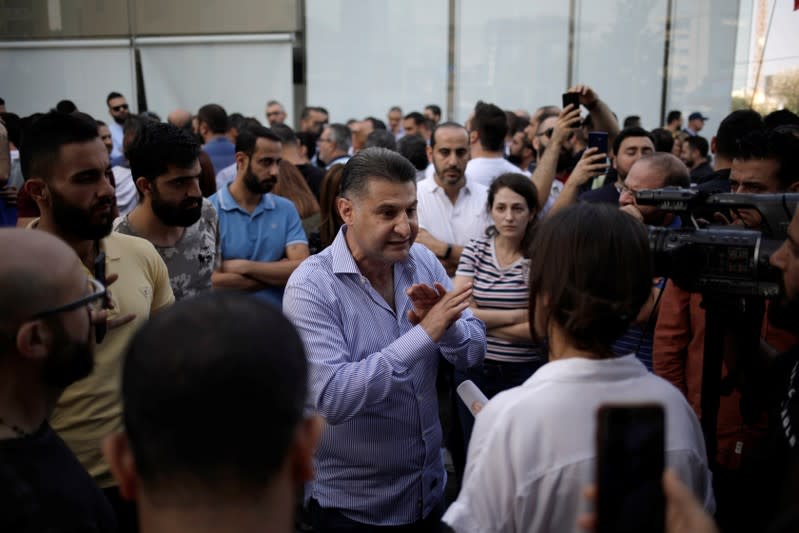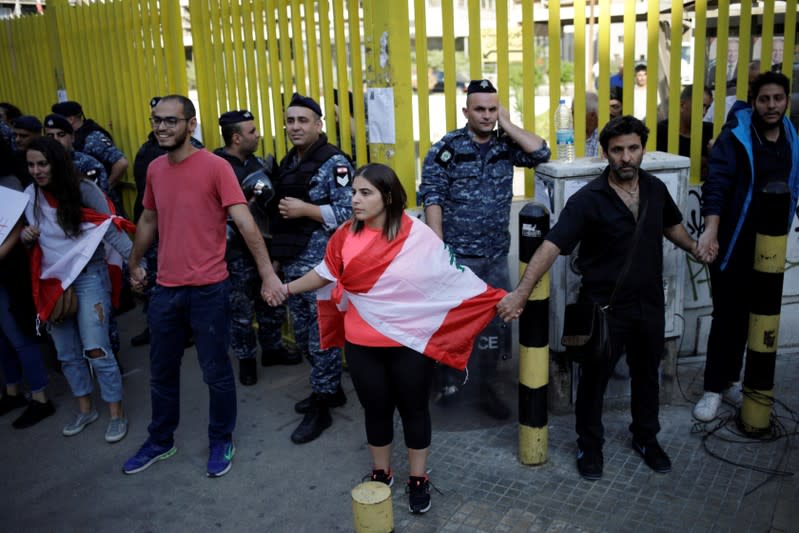Electricity, mobiles and cash - a snapshot of Lebanese grievances
By Ellen Francis
BEIRUT (Reuters) - Lebanese are protesting outside failing state agencies they see as part of a corrupt system in the hands of the ruling elite, as well as at banks they deem part of the problem.
Protesters accuse sectarian political leaders of exploiting state resources for their own gain through networks of patronage and clientelism that mesh business and politics.
Where have Lebanese protested and why?
ELECTRICITE DU LIBAN (EDL)
Lebanon's electricity sector is at the heart of its financial crisis, bleeding some $2 billion in state funds every year while failing to provide 24-hour power.
"This is one of the peak symbols of corruption," said Diyaa Hawshar, an electrician protesting outside state power firm EDL in Beirut. "We pay two bills, one for the government and another for generators."
"It's about carving up the cake, with deals on power barges and overhauling power plants, shady deals in public and under the table," he said. "Every minister who comes makes promises. They come and go."
Power cuts can last several hours every day.
People and businesses rely on so-called "generator mafias" who often have political ties and charge hefty fees to keep the lights on.
The average household ends up paying $300 to $400 a month on average for electricity, said Jad Chaaban, economics professor at the American University of Beirut.
Lebanon's minimum wage is the equivalent of $450 a month.
"It is an insult for a lot of people to keep paying for services that are dysfunctional and at the same time funding the parties and travel of corrupt leaders," he said.
The government has for years touted plans to overhaul the sector including new power stations, fixing the grid and stopping electricity theft.
But the Lebanese saw no tangible progress by the time the prime minister resigned last week.
"People have to beg for their rights...for a few hours of electricity at home," said Mia Kozah, a university student. "It should be one of the simplest matters. Enough humiliation."
MOBILE OPERATORS
At the headquarters of a mobile operator, protesters lamented paying some of the region's most costly phone bills.
Lebanon has only two service providers, Alfa and Touch, which bring in a huge chunk of state revenues.
"These two companies make a lot of money, and we have some of the highest mobile rates," said Rudy al-Haddad, a student.
"We can't take it anymore."
Workers came down to join the protest, furious at a plan to cut their benefits and salaries. They accused the ministry of trying to reduce costs at their expense.
A recent industry report seen by Reuters showed Lebanese spend on average 5% of their household income on mobile services. In Egypt, the average is 1.4% while in the United States it is 2.3%.
Chaaban said Lebanon's government relies on an unsustainable model of taking high tariffs to fund its spending.
A new plan to raise revenues through a fee on WhatsApp calls was one of the triggers for the unrest three weeks ago.
A parliamentary committee has recently called for an inquiry into the telecoms duopoly, raising questions about fake tenders and squandering of public funds. It said operating costs had shot up 29% from 2017 to 2018.
A public prosecutor has called in the two last telecoms ministers to explain ministry spending. On the first occasion, they ignored the request. On the second, which was this week, they could not arrive because of protests.
BANKING SECTOR
Outside banks, people have protested at policies they say have choked off lending to ordinary Lebanese as interest rates have moved higher and higher.
"Interest rates are very high and we can't pay them," said Fatima Jaber, 22, a student protesting outside the central bank in Beirut.
Rubbing salt into the wound, extracts of an official report which a local newspaper published last month suggested prominent Lebanese had benefited from a subsidised housing loan scheme.
A Lebanese official told Reuters that many state officials had benefited from such loans - which are meant to help people who cannot afford to pay for houses but have become hard to secure.
Jaber cited this as one of the reasons she was in the street.
Critics of the banks say they have reaped large profits even as economic growth has stagnated.
Bankers argue their sector is already the biggest source of tax revenue in the private sector. The Hariri government had planned an exceptional tax on bank profits as part of a set of emergency steps.
The sector's defenders regard it as a pillar of stability. They say rising rates stem from central bank efforts to shore up financial stability which the failing state has jeopardised.
At a protest outside the central bank in the southern city of Sidon, Mohammed Younes said he was taking a stand "against a financial approach that has made people poorer and hungrier."
(Reporting by Ellen Francis; Additional reporting by Luke Baker, Laila Bassam and Tom Arnold; Editing by Tom Perry/Mark Heinrich)



